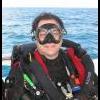
Can we talk?
#1

Posted 11 July 2007 - 10:40 AM
Anyone willing to broach this taboo subject?
#2

Posted 11 July 2007 - 10:47 AM
Regarding the reasons that people die it seems to me that it is people who don't dive a lot, those experiencing heath problems that would have been a problem even were they not in the water, young males just out of OW class doing obviously crazy things, and a few quailified, experienced divers doing challenging dives where risk just can't be eliminated.
I find it interesting to discuss these things however due to the nature of what causes death in this sport I don't think much can be done about it since the reasons I listed above aren't particularly open to change other than the first one unless you feel like trying to change human nature (spitting into the wind comes to mind here).
Edited by gcbryan, 11 July 2007 - 10:58 AM.
#3

Posted 11 July 2007 - 11:02 AM
It seems to me, that nearly every death I've read about in the past few years has been directly attributable to one of three factors.
1. Diving Solo
2. Failure to maintain basics of buddy diving when diving with a buddy
3. Failure to mange/plan air supply.
The first two are insidious because we don't know what would have happened to the person if there had been competent help available to the diver. The third factor is an easy culprit to solve, yet the agencies refuse to address it properly. I don't know why.
Diving "incidents" are commonplace. Reg breathing wet, loss of buoyancy, surfacing away from the boat, becoming ill on the dive, loss of fin or mask. With a competent buddy, and basic safety equipment, each of these things should be a mere nuisance or inconvenience. Certainly a major health event like a heart attack or a shark attack fall outside the bounds of normal underwater occurances. Though I think sometimes divers engage in the sport when they know their health is not what it should be.
So I suppose my questions come down to this:
1. Knowing that solo diving carries significantly more risk than diving with a safe and competent buddy, why engage in it.
2. Why are we producing divers on a regular basis with such substandard skills, and why can't we address this as an industry? Why are we so afraid to NOT hand a diver an OW card?
3. Why, as an industry, have we not implemented even the most fundamental of information about managing air supply while diving? It seems to border on the negligent not to teach divers the basics of how to properly manage their air supply.
Again, these are just my thoughts and out there for discussion. I do not wish to condemn anyone or the way they dive. Rather, I am hoping to open an honest discourse about these things which too often seem to end with the death of recreational divers.
#4

Posted 11 July 2007 - 11:24 AM
I agree with you that there are folks out there that you would think should not have been given C-cards. The question I have is: did they come out of class this way or is it more lack of diving to maintain skills. I tend to believe that it is both. It goes without saying that diving requires a skill set that can only be maintained through use, use and more use. I try to dive pretty regularly but with that said I can see a difference after a week's worth of steady diving on a trip somewhere.
I think this is going to be an interesting discussion. I hope more folks chime in.
__________________________________________________
me and you and a dog named Boo....
#5

Posted 11 July 2007 - 11:30 AM
In the past few years, in looking at the accident scenarios I've seen, very few could be contributed to the factors your listed. Or at least they were the beginnings of the chain, that should have been able to be stopped, but were not.
It seems to me, that nearly every death I've read about in the past few years has been directly attributable to one of three factors.
1. Diving Solo
2. Failure to maintain basics of buddy diving when diving with a buddy
3. Failure to mange/plan air supply.
Perrone are you referring to accidents 'you've' seen meaning personally? Or are you referring to accidents you are aware of via perhaps documented resources?
It would help to have everyone on the same page with respect to why divers have died, how many, etc and if you have resources you can share that show the reasons that would be a great start.
Note, I am not disputing your conclusions but since you want a serious and open, honest but respectful discussion on the matter, having some basis for the conclusions you've drawn would help.
Contact me directly at Kamala@SingleDivers.com for your private or group travel needs or 864-557-6079 AND don't miss SD's 2018-2021 Trips! ....here! Most are once in a lifetime opportunities...don't miss the chance to go!!
SD LEGACY/OLD/MANUAL Forms & Documents.... here !
Click here TO PAY for Merchandise, Membership, or Travel
"Imitation is the sincerest flattery." - Gandhi
"Imitation is proof that originality is rare." - ScubaHawk
SingleDivers.com...often imitated...never duplicated!
Kamala Shadduck c/o SingleDivers.com LLC
2234 North Federal Hwy, #1010 Boca Raton, FL 33431
formerly...
710 Dive Buddy Lane; Salem, SC 29676
864-557-6079 tel/celfone/office or tollfree fax 888-480-0906
#6

Posted 11 July 2007 - 11:38 AM
There are good divers, poor divers, those who aren't that interested in diving, those that are, etc. People are people. I wish all climbers/hikers were more skilled and knowledgeable but they are not. Whether or not they die is another matter.
It sounds like you have an agenda after reading your second post. Correct me if I'm wrong.
If you read a report where someone died and you attribute it to being solo just because they were solo that is not a cause of death. Most people who die do have a buddy yet they die. Running out of air is someone who is inexperienced and an infrequent diver which was my first listed cause of death.
Telling someone who isn't as healthy as another person not to dive is not anyone's place. If it is a serious problem they should tell their buddy. I would like it if everyone thought and acted exactly like me but it's not going to happen and since I like diversity in the world it's probably a good thing.
The bottom line is that not that many people are dying. One might wish that life was a little less sloppy and that all divers were more skilled and experienced. It would be nice but it's not going to happen.
By the way, from reading the DAN reports from several years ago I think my first post would be similar to their results. From personal observation of local deaths I would rate inexperienced/infrequent divers as the cause.
I would also add that there is a difference between discussing what is killing divers and discussing how we can be better divers. Even if there were no deaths we could all still be better divers. This dicussion was about what is killing divers.
Edited by gcbryan, 11 July 2007 - 12:18 PM.
#7

Posted 11 July 2007 - 11:41 AM
I think we will agree to disagree about solo diving. I will only mention that I have been in the water with insta-buddies that turned my dive into a babysitting gig (I also have had insta-buddies that I would love to dive with regularly). Enough said.
Yes a very true point and one that is a strong motivator for many people to look at redundancy and solo diving.
I will say since this is a great opportunity to do so that at SingleDivers.com you will never get an insta-buddy as you referred to them as. You will have the chance to dive with one or more people in the same skill bracket, air consumption, diving style etc. And if the initial match does not work...you can change. Simple as that. That is one of the reasons so many of our divers are DM's, Instructors and very seasoned pros...they are not asked to dive with a newer diver unless they are paid for it or they offer to do it. And even if they offer...they will tell you I usually dive with a newer diver(s) myself and so they get to have fun diving their own profiles.
I agree with you that there are folks out there that you would think should not have been given C-cards. The question I have is: did they come out of class this way or is it more lack of diving to maintain skills. I tend to believe that it is both. It goes without saying that diving requires a skill set that can only be maintained through use, use and more use. I try to dive pretty regularly but with that said I can see a difference after a week's worth of steady diving on a trip somewhere.
Excellent point! You have to use it or lose it. You can have excellent skill instruction in class and show competency but if you are not practicing them...you will not keep them. Of course diving is the ONLY sport where when you get your learner's permit...you think you are ready for anything...and you only use it 1-2 times a year too boot! No one would think that after getting your driving learner's permit you were ready to drive on icy roads, in a big city, in rush hour traffic, over a narrow bridge with a semi beside you, on the Autoban etc. Yet get your OW cert and most divers feel they are ready to tackle just about any diving challenge. And this is NOT agency specific. It is just inherent in this sport.
I think this is going to be an interesting discussion. I hope more folks chime in.
Yes this will be interesting. To keep it going you will all need to look at root cause issues, discuss all theories respectfully and lay no blame on any agency or the topic will be pulled or closed.
This can be a great discussion IF you are not evangelizing or preaching. Keep an open mind, offer respectful opinions and everyone will learn. Thank you, - ww
Contact me directly at Kamala@SingleDivers.com for your private or group travel needs or 864-557-6079 AND don't miss SD's 2018-2021 Trips! ....here! Most are once in a lifetime opportunities...don't miss the chance to go!!
SD LEGACY/OLD/MANUAL Forms & Documents.... here !
Click here TO PAY for Merchandise, Membership, or Travel
"Imitation is the sincerest flattery." - Gandhi
"Imitation is proof that originality is rare." - ScubaHawk
SingleDivers.com...often imitated...never duplicated!
Kamala Shadduck c/o SingleDivers.com LLC
2234 North Federal Hwy, #1010 Boca Raton, FL 33431
formerly...
710 Dive Buddy Lane; Salem, SC 29676
864-557-6079 tel/celfone/office or tollfree fax 888-480-0906
#8

Posted 11 July 2007 - 11:47 AM
3. Why, as an industry, have we not implemented even the most fundamental of information about managing air supply while diving? It seems to border on the negligent not to teach divers the basics of how to properly manage their air supply.
I just finished a trip aboard a Dive Vessel in NC where the DM's advised everyone to practice a rule of thirds... 1/3 of your gas out from the anchor, 1/3 back to the anchor and 1/3 to ascend as well as for contingency purposes. While not necessarily the classic rule of thirds...it was very fitting for the destination.
Knowledge that is useful, good and helps divers will always spread even in non-traditional ways. This is good.
As for teaching basic air management...this dive operator runs a full dive staff and shop. They teach many new open waters divers in a year. They teach air management. I think many others do as well.
Contact me directly at Kamala@SingleDivers.com for your private or group travel needs or 864-557-6079 AND don't miss SD's 2018-2021 Trips! ....here! Most are once in a lifetime opportunities...don't miss the chance to go!!
SD LEGACY/OLD/MANUAL Forms & Documents.... here !
Click here TO PAY for Merchandise, Membership, or Travel
"Imitation is the sincerest flattery." - Gandhi
"Imitation is proof that originality is rare." - ScubaHawk
SingleDivers.com...often imitated...never duplicated!
Kamala Shadduck c/o SingleDivers.com LLC
2234 North Federal Hwy, #1010 Boca Raton, FL 33431
formerly...
710 Dive Buddy Lane; Salem, SC 29676
864-557-6079 tel/celfone/office or tollfree fax 888-480-0906
#9

Posted 11 July 2007 - 12:50 PM
In my experience, more problems are caused by human error than anything else. Very skilled, careful divers make fewer errors than less skilled or less careful divers. In most situations, a diver who is very careful and very skilled will be put at more risk by having a buddy than by diving alone. Most divers are neither skilled nor careful, so unless that diver is buddied with an equally skilled, equally careful diver (not likely), the chances of diver error on his dive increase with the addition of a buddy.
DSSW,
WWW™
#10

Posted 11 July 2007 - 12:53 PM
I just don't have the problem about solo diving that others seem to have, and I don't really have much of a belief in the theory that solo diving is the cause of many of the accidents that happen. While I won't deny that the outcome can possibly be improved should an accident occur in many instances, there are many where being alone or with others also would not change the end result.
I bring all of this up because I would not vote for the first two factors to be included in the list. My list would include things like:
- Failure to obtain proper/adequate training in the first place (especially for the type of dive conducted);
- Complacency (This is the BIG ONE);
- Distraction;
- Underlying health problems that arise during the dive.
Health issues can often be detected and prevented by early detection, diet and conditioning. I know that I am guilty of not doing enough in this category though I probably do more than most: vegetarian, supplements, annual physicals and diving specific screening, some physical conditioning. However, this is another big area of cause.
"For the diligent diver, closed circuit rebreathers are actually safer than open circuit scuba." Tom Mount
#11

Posted 11 July 2007 - 01:01 PM
I do not have reliable statistics on SCUBA deaths, and even DAN only collects US/CAN waters and citizens, so it's not global. But I think DAN counts about 100 deaths per year.
Here are a few above 100 from the NSC (National Safety Council) which are US numbers for 2003 of the 109,277 Deaths Due to Unintentional (Accidental) Injuries. I suspect most of the SCUBA deaths are probably buried in the 412 drownings listed. I did not see an entry specific to SCUBA.
Exposure to excessive natural cold 620
Fall from out of or through building or structure 600
Fall on same level from slipping, tripping, and stumbling 597
Water transport accidents 573
Drowning and submersion while in or falling into swimming pool 515
Accidental suffocation and strangulation in bed 497
Occupant of heavy transport vehicle 442
Fall on and from ladder or scaffolding 417
Drowning 412
Exposure to electric current, radiation, temperature, and pressure 396
Inhalation of gastric contents 393
Alcohol 373
Legal intervention involving firearm discharge 347
Drowning and submersion while in or falling into bath-tub 332
Other and unspecified smoke fire and flames 315
Other and unspecified electric current 280
Other accidental hanging and strangulation 277
Exposure to excessive natural heat 273
Firearm discharge 232
Nonopioid analgesics, antipyretics, and antirheumatics 210
Occupant of special agricultural vehicle 175
Exposure to animate mechanical forces 171
Explosion of other materials 147
Caught between objects 136
Hanging, strangulation, and suffocation 108
Ignition or melting of other clothing and apparel 104
Animal rider or occupant of animal-drawn vehicle 101
Other and unspecified chemicals and noxious substances 100
Exposure to smoke, fire, and flames 100
Jacques Yves Cousteau
#12

Posted 11 July 2007 - 01:34 PM
Most of the accident scenarios I have read seem to be related to one of two causes.It seems to me, that nearly every death I've read about in the past few years has been directly attributable to one of three factors.
1. Diving Solo
2. Failure to maintain basics of buddy diving when diving with a buddy
3. Failure to mange/plan air supply.
They had some sort of health problem, heart disease etc.
They were over diving their skill level.
I am not sure how a dive op could have prevented some of the incidents either. I mean, you could get an OW certification and become a very skilled diver, able to handle any condition or situation you come up against.On the other hand you can get your OW and then start collecting c cards, but not really know much of anything, but are able to buy your way onto any boat whether you can handle the dives or not.
I don't know how to correct these problems. DMs could refuse the obviously out of shape divers, but many people look bad, but can out perform people who look in shape but arent. PT test in the parking lot? I doubt tht would go over to well...
You should start failing people that can't perform the skills properly. Maybe instructors can help me out here, but why are skills that are tested in the pool also tested in open water? I mean, there is no difference in clearing my mask in the pool vs ow. Why not have all the skills graded and video taped in the pool, with absolute pass fail requirements, and leave the open water dives for real dives where students get experience really swimming in current or surge with gear on?
My OW checkouts were carbon copies of the pool sessions, only 5-10 feet deeper and in salt water.
I would think it would be hard to pin a death on solo diving as you generally can't really tell what happened, even if you know COD you can't often say for sure how you got from A to B. In most cases the solo can be at most listed as a contributing factor, but there is no gaurantee a buddy could have prevented a death. You could probably also come up with some double deaths where one buddy paniced and killed the other, so I am not sold on the idea that in shallow rec diving solo diving is more dangerous. At least with skilled and properly equipped divers.
YMMV
"Winter is not a season, it's an occupation." -Sinclair Lewis
Meet Pearl and Opal, the new shark rays in Adventure Aquarium.
#13

Posted 11 July 2007 - 01:38 PM
1. Diving Solo
2. Failure to maintain basics of buddy diving when diving with a buddy
3. Failure to mange/plan air supply.
I'd question the validity of this list as the top three.... Where do 'fitness to dive'/heart attacks sit....?
#14

Posted 11 July 2007 - 01:44 PM
..there are folks out there that you would think should not have been given C-cards. The question I have is: did they come out of class this way or is it more lack of diving to maintain skills. I tend to believe that it is both. It goes without saying that diving requires a skill set that can only be maintained through use, use and more use. I try to dive pretty regularly but with that said I can see a difference after a week's worth of steady diving on a trip somewhere.
Very true. I had dinner with a family friend last night who told me how he and his son both got certified at a resort three years ago. Neither have dove since. He vaguely remembered going down a line to the bottom on his checkout dive, but, couldn't remember if they ever left the line. He said he remembered having a lot of trouble controlling his buoyancy and spend most of the dive sort of pushing off the bottom so that he could move around. When I asked him whether his BCD was malfunctioning he responded, "Is that the thing you wear on your back?"Fortunately (I think) this guy is smart enough not to even think about diving again without aditional instruction. But, it is scary to think that he holds a license to walk into any dive shop, rent gear, and go out on a charter boat in North East waters with a buddy who may not be any more experienced than he is.
When you make fish laugh, they can't bite you.
#15

Posted 11 July 2007 - 01:47 PM
"Winter is not a season, it's an occupation." -Sinclair Lewis
Meet Pearl and Opal, the new shark rays in Adventure Aquarium.
1 user(s) are reading this topic
0 members, 1 guests, 0 anonymous users




















